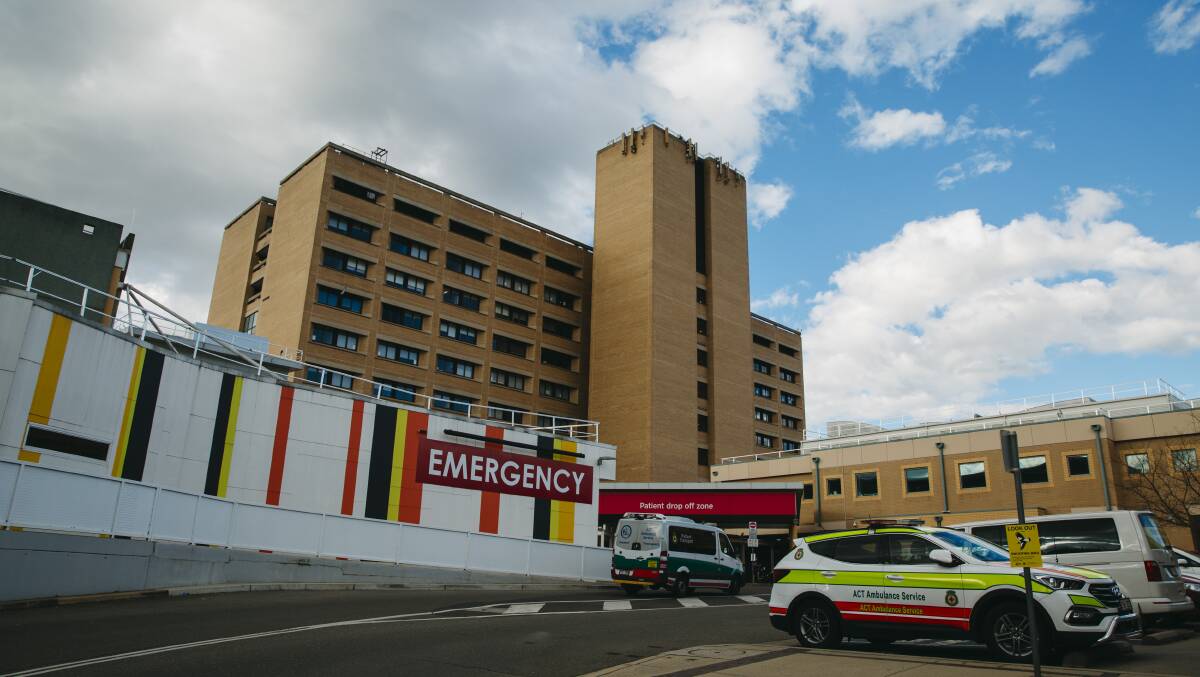Four of the five people being treated in ACT intensive care units with COVID-19 are not fully vaccinated, prompting fresh encouragement for people to take up vaccinations amid increasing pressure on the territory's health system.
The territory's hospitals are working to manage significant staff shortages, with a large number of staff forced into isolation as a result of coronavirus infections and exposure.
More than 4 per cent of Canberra Health Services staff are currently in isolation and unable to come to work, which has added significant strain to the health system.
There were 538 staff across the ACT health system - which includes workers at public and private hospitals - in isolation on Wednesday and unable to come to work. There were 329 public health staff members isolated.
Acting Health Minister Chris Steel said the territory's hospitals were still able to manage the current caseload, but there were sufficient plans in place to surge up capacity if required.
"At this stage we haven't seen hospitalisations get to a stage where we need to enact the territory wide health response, including getting more support from private hospital staff," Mr Steel said on Wednesday.
"But we'll continue to monitor the spread of the virus and how it's impacting on our hospitals."
The ACT reported 1467 COVID-19 cases on Wednesday, including 654 PCR-confirmed infections and 813 diagnosed with rapid antigen tests.
There were 60 people in hospital with COVID-19 at 8pm on Tuesday, but Mr Steel said the bulk of these were not being treated for their coronavirus infection and were being treated for other ailments across a variety of different wards.
There were 63 COVID-19 positive patients in ACT hospitals at 8pm on Monday, the day internal government modelling had predicted a peak in hospitalisations. It was the highest caseload the territory's hospital system had ever managed.
Mr Steel said the low vaccination rates among patients in intensive care with COVID-19 demonstrated the importance of vaccine take up.
"It's the best way that can protect [Canberrans] from serious disease," he said.
A person is still considered to be fully vaccinated if they have received two doses of a COVID-19 vaccine, with consideration still being given to updating the definition to include booster doses.
Meanwhile, the ACT government announced it would bring forward a reduction in the time people need to wait before receiving their COVID-19 booster dose.
Eligible Canberrans - those over 18 who had their second dose three or more months ago - will be able to book in for the booster shots from Thursday on the ACT's MyDHR system online or by calling the vaccination booking line.
A third of Canberrans aged 18 and over have now had their booster dose, while 34.2 per cent of children aged five to 11 in Canberra have had their first vaccine dose.
Mr Steel said the ACT government's two vaccination clinics - at the Australian Institute of Sport arena and the Canberra Airport - had capacity to administer 32,500 vaccinations a week.
"Reducing the interval to three months will mean an extra 183,000 Canberrans are now eligible to receive their booster," he said.
The shift to a three-month waiting period between second doses and booster shots was due to be made on January 31, but the government said it was brought forward due to strong vaccine supply and clinic capacity.
However, health authorities warned general practitioners and pharmacies may already be at capacity for vaccine delivery, and those who had received their primary vaccination course from their doctor or pharmacist could book in for a booster at a government clinic.
ACT Health also failed to release its detailed epidemiological snapshot before 6pm on Wednesday for the second week in a row.
The report - which is a one-page summary of the COVID-19 situation in the ACT, and has previously included an age breakdown of infections and other key information - was due to be released on Wednesday, ACT Health said in a statement at 1.03pm.
Last week's report, which confirmed Omicron had become the dominant COVID-19 variant in the ACT, was released late on Wednesday night.








